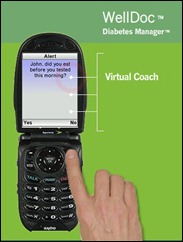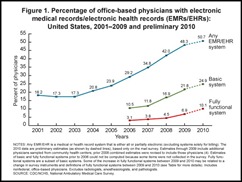News 12/21/10
Top issues influencing the health industry next year include: increased demand for HIT professionals as providers spend more on HIT; new risks and opportunities resulting from new payment models, such as accountable care organizations; and, more mergers and acquisitions as providers look for ways to share administrative and IT costs. Those predictions courtesy of PwC’s Health Research Institute.
eClinicalWorks CEO Girish Navani chats with a local paper about company’s upcoming move, eCW’s history, and recent financial performance. Here are a few tidbits:
- eCW is spending $18 million for the new site, which includes the purchase of a 100,000 square foot building, renovations, and furniture. The move is scheduled for early next year.
- The company anticipates its 2010 revenues will hit $130 to $150 million, up from $100 million in 2009.
- Over the next 12 months, eCW plans to hire an additional 100 to 200 more employees to its existing 1,300 person workforce.
Wills Eye Health System (PA) contracts with NextGen for its EHR and PM products.
athenahealth tells investors its FY2011 earnings won’t meet expectations with predicted earnings of $0.68 to $.78/share versus expectations of $.85. Shares slipped on the news Thursday but were moving back up by Monday.
Employment in doctor offices fell by 500 employees in November but grew by 8,000 in hospitals, according to the Bureau of Labor Statistics.
This won’t help employment statistics: Gulfcoast Oncology Associates of St. Petersburg (FL) plans to lay off 197 employees by February. The 70-physician group was recently purchased by Florida Cancer Specialists.
Geolocation technology will likely play an increasingly larger role in healthcare, despite HIPAA privacy concerns. Geolocation services, such as Foursquare and Facebook Places, allow patients to voluntarily check in various locations, including their doctor offices. Possible benefits for provider: attracting new patients or for promoting certain services, such as flu clinics.
The one-size-fits-all design for EHRs does not address workflow demands of all physicians, according to a new UC Davis study. Physicians who have invested time using various EMRs would likely draw the same conclusion. After implementing an EMR, physician productivity dips a painful 25 to 33%, though some specialties eventually return to better than original productivity. Other specialties (in this case FP and pediatrics) didn’t return to original productivity levels. The conclusion: there is a “mismatch between technology design and the work-flow requirements and health administration expectations” for different specialties.
Slow week in the HIT world, but since Mr. H is still slaving away, I figured I better show moral support and dig deep for industry news. Feel free to send me an email with your juicy news, holiday greetings, or last minute shopping tips.

















Re: Walmart Health: Just had a great dental visit this morning, which was preceded by helpful reminders from Epic, and…